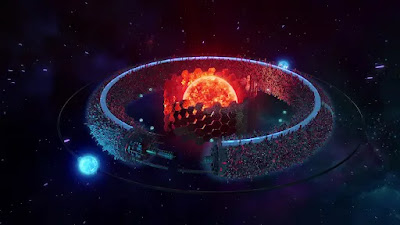 Chances are that a lot more people in the world believe that God had some role in the creation of Humanity than the scientific version, which begins with the Big Bang. As such, then, God is the most popular choice for First Contact, or interaction with an extraterrestrial. Actually, he has no competition in this vote because no intelligent life form has yet ever made contact, as confirmed by any reliable source.
Chances are that a lot more people in the world believe that God had some role in the creation of Humanity than the scientific version, which begins with the Big Bang. As such, then, God is the most popular choice for First Contact, or interaction with an extraterrestrial. Actually, he has no competition in this vote because no intelligent life form has yet ever made contact, as confirmed by any reliable source.I start with Global Religion 2023, a 26-country Global Advisor survey by Ipsos.
- These countries were all reasonably developed, with 46% of the respondents believing in some form of Christianity. Only 7% Buddhist, 6% Muslim, mostly Sunni, and 4% Hindu. Interestingly enough, 29% with no religion or not religious.
- India, Turkey, Japan and Thailand were surveyed, but the dominant group of countries came from Europe.
- South Korea had 53% with no religion, Sweden 50%, Netherlands 48%, UK 48%, Belgium 47% and Japan 46%. Thailand 1% with no religion and India 0%.
- Only 61% believed in God or a higher power/spirit. 21% no God and 20% preferred not to say. Brazil and South Africa had 89% believing, the USA was at 72%, South Korea 33% and Japan an amazingly low 19%. With all those shrines and festivals, you would think otherwise.
- 52% believed in Heaven, 49% ghosts/etc., and 41% Hell.
- To the question, religion does more harm than good: India 73%, Sweden 70%, U.S. 39%, Turkey 35%, and Thailand 27%.
- To the question, people with religious faith are better citizens: India 79%, U.S. 39%, Japan 20% and Hungary 16%.
It's hard to get universal world-wide data, so I will focus on the USA, realizing that these numbers could vary from what is shown above because opinions change over time, and there is a range of beliefs.
- 74% believe there is a God, 83% Republicans and 66% Democrats.
- 40% generally do not believe in global warming, that Earth is 4.5 billion years old, or humanity evolved through natural selection.
- 51% do not believe in the Big Bang theory.
- Religion, scientific ignorance and attitudes of people like Donald Trump are blamed for the above.
- In any case, there is an iron triangle, for to religion and science you need to add politics.
Sometimes it depends on who asks, or how you ask the question, for Gallup regularly surveys Americans, and from 1945 to 1970 showed that 98% believed in God, but this number dropped to 81% in 2022. In 2022:
- People of color had a belief % of 88.
- 87% if 65 and older.
- 68% if from 18-29 years old.
- 94% Conservative, 92% Republican, 72% Democrat and 62% liberal.
About first contact, some think they are already here, or were, sometime in the past. New Scientist has a top 10 evidence for alien life.
- 1976 Hardly what I'm looking for, as it was the 1976 Viking Mars detection of chemical signatures...but on Mars?
- 1977 Wow! signal detected by an Ohio State University radio telescope. This was a 37-second-long signal that was startling and remains unexplained.
- 1996 Martian fossils on a meteorite found in Antarctica. This one is far-fetched for it was released as NASA was trying to influence Congress about their budget. But get this: the meteorite might have been blasted off Mars in a collision, wandered about space for 15 million years, falling on Antarctica and discovered in 1984. Then, 12 years later, conveniently announced. Nope, another example of too much deep searching.
- 2001 The 1961 Drake equation was put to rigorous test, and the result suggests that an inhabited Earth-like planet could be "only" a few hundred light years away. Sure, but no contact.
- Incidentally, the results of the Drake Equation were updated, with Adam Frank (on the left) and Woodruff Sullivan calculating that human civilization is likely unique in our cosmos if the odds of one developing on a habitable planet are less than one in 10 billion trillion:
One in 10 billion trillion is incredibly small,” says Frank. “To me, this implies that other intelligent, technology producing species very likely have evolved before us. Think of it this way. Before our result you’d be considered a pessimist if you imagined the probability of evolving a civilization on a habitable planet were, say, one in a trillion. But even that guess, one chance in a trillion, implies that what has happened here on Earth with humanity has in fact happened about a 10 billion other times over cosmic history!
 2001 A red tinge of Jupiter's moon Europa might be because of frozen bits of bacteria. C'mon.
2001 A red tinge of Jupiter's moon Europa might be because of frozen bits of bacteria. C'mon.- 2002 Russian scientist argued that a mysterious radiation-proof species of microbe may have evolved on Mars. Again, on Mars, and wow, what creativity.
- 2002 Chemical hints of life are found in old missions to Venus in the 1970's. But Venus is not Earth, and hints???
- 2003 Again Europa, which showed sulphur traces, indicating that there might be underground bacterial colonies. In case you were wondering, if life is found in our solar system, moons of our outer planets starting with Jupiter and Saturn seem more probable than Mars or Venus, and Europa is #1 on most lists.
- 2004 Methane in the Martian atmosphere hints at microbial metabolism. You wonder why those landers did not show any methane, but these methane measurements came from telescopes. Nearly all the methane in our atmosphere is produced by bacteria and other life.
- 2004 In February 2003, SETI astroners using the Puerto Rico telescope (the one you saw in the early part of the film, Contact) yielded interesting radio signals, the strongest from between the constellations Pisces and Aries--where there are no obvious stars nor planets--at the frequency of hydrogen some astronomers believe would be the likely one at which aliens would transit, remains unexplained. Perhaps this could be a natural phenomenon still unexplained, for in 1967 a weird pulse radio signal was later shown to be the first sighting of a pulsar. Incidentally, Arecibo, that Puerto Rico telescope, collapsed in 2020.
- None of these look too credible, so the Fermi Paradox still holds.
Any more recent findings? Well, in 2020 SETI researchers hunting for radio signals from alien civilizations detected intriguing signals from Proxima Centauri, the nearest star to us, "only" 4.2 light years away. Tantalizingly, the signal shifted slightly while it was being observed, resembling the movement of a planet. There are two exoplanets orbiting this star. This was part of the Breakthrough Listen project.
I hesitate even including the notion of alien astronauts in this discussion, for they are pseudoscientific and in the realm of pulp media, but they do entertain, so what about:
- Chariot of the Gods by Erich von Daniken? He tosses in Stonehenge, Easter Island, Nazca Lines, Maya texts and Pyramids of Giza. He was popularized by Rod Serling, but there is no validation.
- Does Area 51 in Nevada and Roswell, New Mexico have any kind of validity? They have inspired films and books, and that's about it.
- There are many more, but I'll stop here.
- No form of life has yet to be detected beyond Planet Earth.
- The odds of life developing on an exoplanet is one in a million, but there are a 100 million worlds out there showing potential. If Earth did it, was this a one of a kind miracle? Most experts think not.
- The odds of microscopic life gaining intelligence has one example, Earth. What are the true odds? According to this article, rare.
- Current thinking is that the chances are that organic civilization might not last very long, for artificial intelligence should prevail over time. While a survey of 2,700 AI researchers said there was only a 5% chance that AI will destroy humanity, there was a sense of this being in the relatively near future. In a hundred years? Thousand? Million?
- Signals from outer space show potential for detection for billions of years.
- There are techno-signatures like Dyson spheres (right) that should be observable from Earth, but none has been detected.
- Travel for light-year distances will be difficult, even for electronic life. Remember, light takes 200,000 light years just to travel from one end of our Milky Way Galaxy to the other. Maybe worm holes and the like, but energy will always be a problem. The odds of "flying saucers," thus, are remote.
- Our universe is less than 14 billion years old. The lifetime should be around 100 trillion years, so we have a long way to go. It is possible into the future that various intelligent life forms will develop, and interact, but nothing like Star Wars or Star Trek. It will almost surely be electronic.
I'll end with Stephen Hawking, who passed away six years ago, but left some messages.
- Warned against trying to communicate with alien civilizations.
- Warned about a future with artificial intelligence.
- In his 2002 book, The Theory of Everything: The Origin and Fate of the Universe:
For centuries, it was believed that disabled people like me were living under a curse that was inflicted by God. Well, I suppose it's possible that I've upset someone up there, but I prefer to think that everything can be explained another way, by the laws of nature. If you believe in science, like I do, you believe that there are certain laws that are always obeyed. If you like, you can say the laws are the work of God, but that is more a definition of God than a proof of his existence. We are each free to believe what we want and it’s my view that the simplest explanation is there is no God.


















Comments
Post a Comment